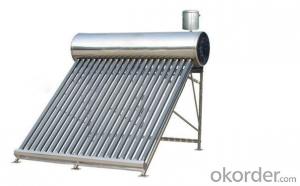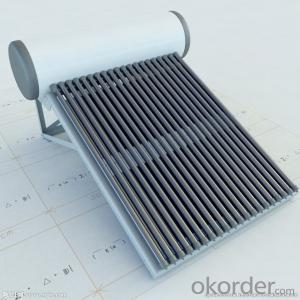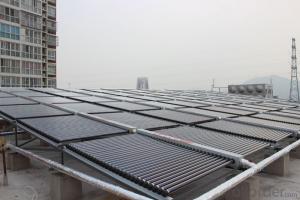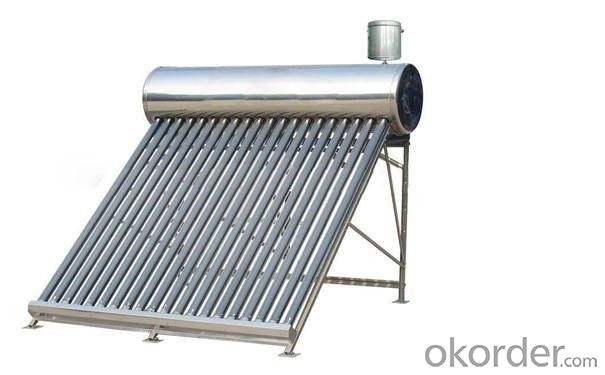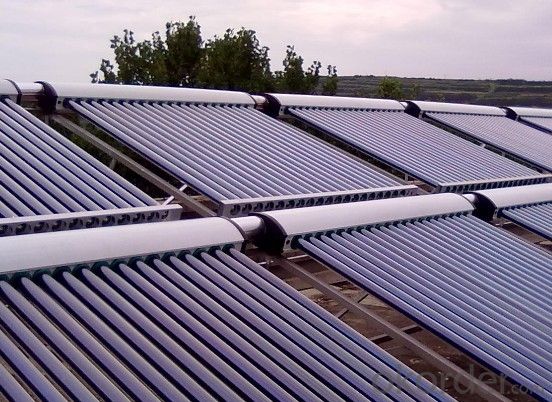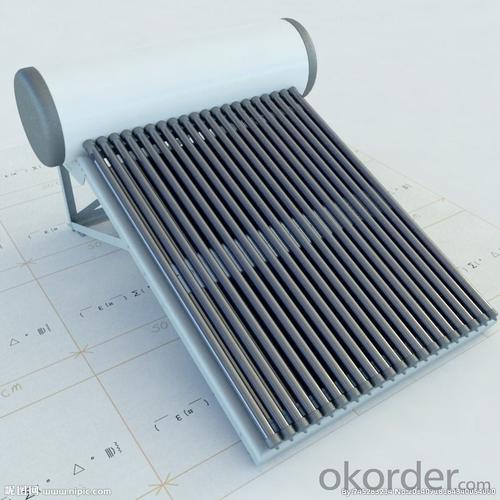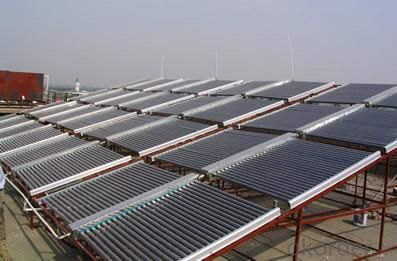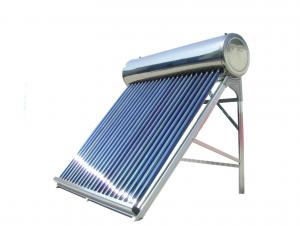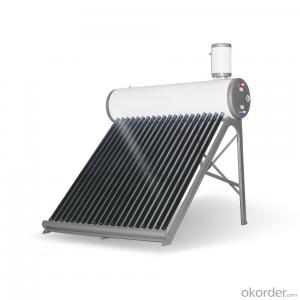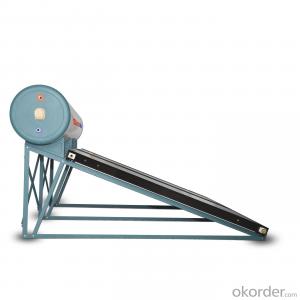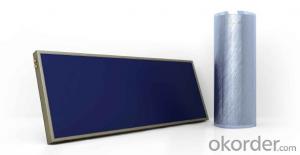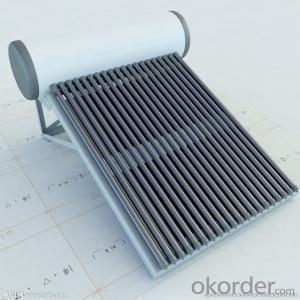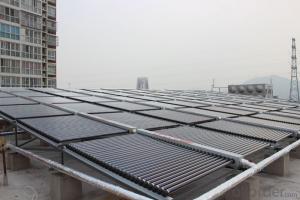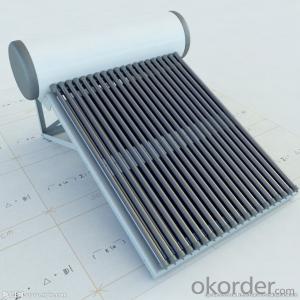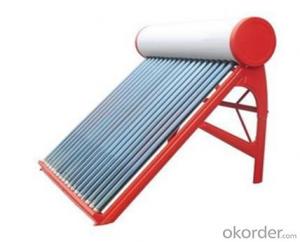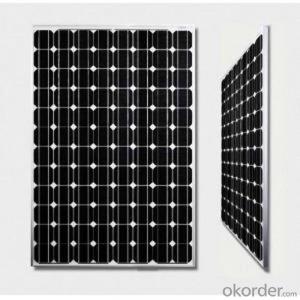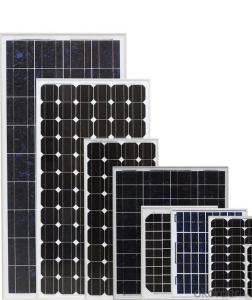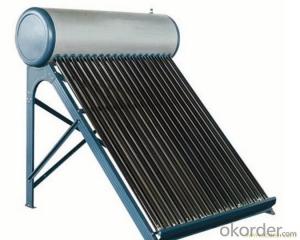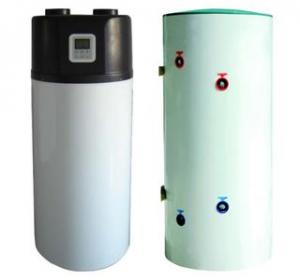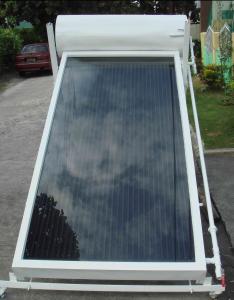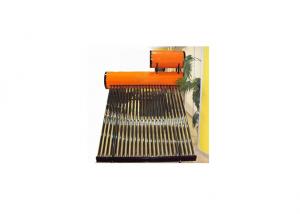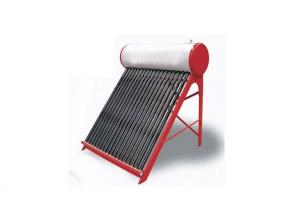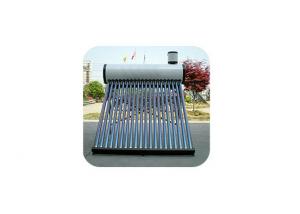250L-300L Solar Water Heater for Trough - China Famous Brand
- Loading Port:
- China main port
- Payment Terms:
- TT OR LC
- Min Order Qty:
- 10 set
- Supply Capability:
- 10000 set/month
OKorder Service Pledge
OKorder Financial Service
You Might Also Like
Solar water heaters features
1. The upright tank can make the water temperature to a high level. It can hot the water instantly
2. The tank inside the building, the hot water loses less energy than the normal one
3. The solar collector and the tank of solar water heater is separated, that makes the system combine with the building perfectly, which will reduce the sightseeing for the building and environment around
4. Back up with electric heater so that in the day without sunshine hot water can also be used
5. Can be combined with gas or electric heater
6. Max. Pressure: 12bar; Operating Pressure: 6 bar
7. It can be used for other function, such as warming
Solar water heaters working principle
1. The solar collector absorbs solar energy and transmits it to the solar water heater tank through circulation
2. When the temperature of the collector reaches the set value, the controller starts the circulation pump automatically
3. The circulation pump makes heat-conducting liquid circulate automatically
4. The heat-conducting liquid transfers heat to water by lower heat exchanger in the water tank.
5. When the temperature difference between solar collector and heat pipe solar water heaters tank doesn't reach the set value, the circulation pump will be shut automatically
6. In case the temperature of the water tank does not reach Tmax, Electric Heating Element will start to work automatically
Solar water heaters working station component:
1. Operating screen
2. Manometer
3. Pump speed adjust switches
4. Temperature difference circulation pump
5. Flow rate indicator
6. Return circuit connector
7. Safety valve
8. Expansion vessel connector9. Return circuit connector
10. Wall mounting
11. Expansion vessel:8L
12. Pressure resistance: 10 bar pressure for expansion vessel
Solar water heaters specification:
Description | solar water heaters |
Material of out manifold | 0.55mm thickness color steel/ fluorine carbon steel |
Material of inner tank | Food grade 2.0 mm thickness SUS304 stainless steel |
Tank insulating layer | 40mm 45kg/m³ high-density polyurethane foamed |
Inlet and outlet hole | Male G1'' |
Max pressure | 0.6 Mpa |
Solar collector tube | 3.3 Borosilicate glass with N/Al coating |
Thickness of glass tube | 1.6mm |
Vacuum tube tightness | P≤0.005 Pa |
Absorption | as=0.93-0.96 (AM1.5) |
Emission ratio | εh=0.04-0.06 (80C±5C) |
Idle sunning property parameters | Y=220~260m2.C/KW |
Average heat loss coefficient | ULT=0.6~0.7W/(m2.C) |
Bracket: | 2.0mm thickness aluminum alloy |
Tank weight | 75KGS |
Tank size | 560mm Dia x 1810mm Height |
Tank capacity | 300L |
Solar collector | 2pcs 58x1800x15tube solar collector |
Absorber area | 2.811 m² |
Working station | SP116 working station |
Heat exchanger length | Upper:12m, Underside:18m |
Solar water heaters details show:
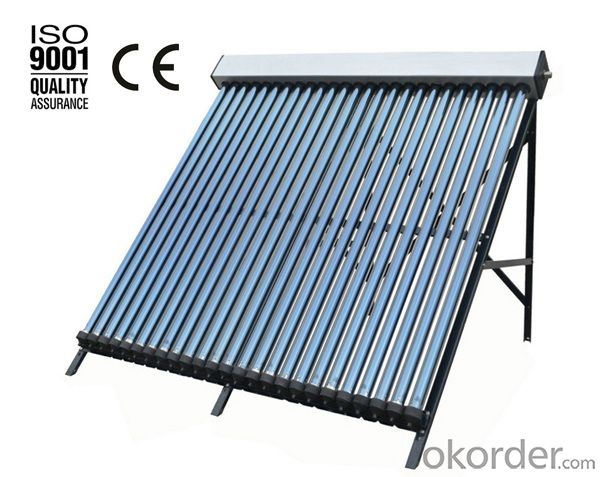
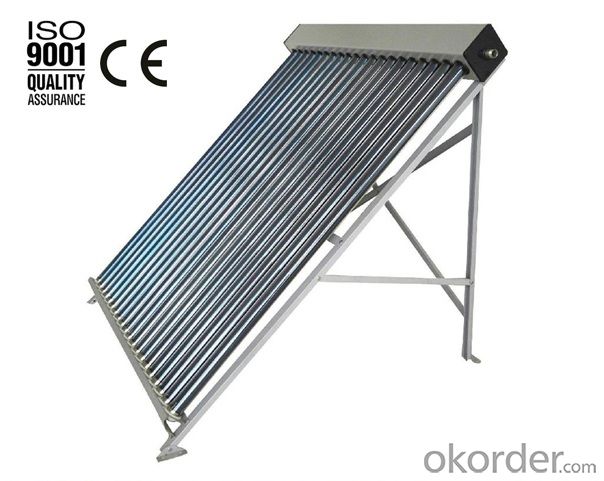
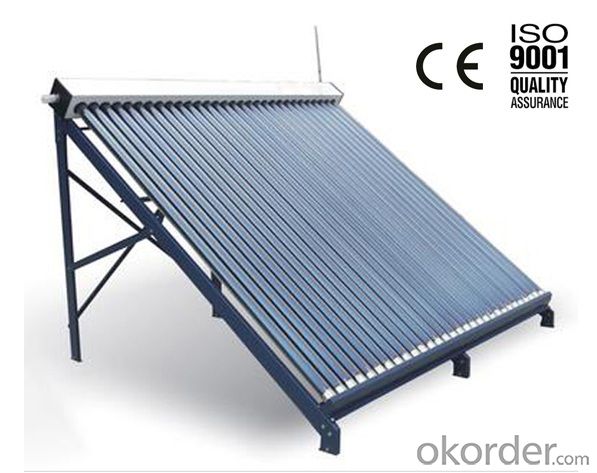
Benefits of this kind of solar water heaters:
1. Prolong the life of your existing water heater
2.Costs less than an electric, gas or oil water heater
3.No maintenance required
4.Lasts longer than a traditional hot water heater
5.Reduce your water heating costs
- Q: Can a solar water heater be used for heating water for a hydronic heating system?
- Yes, a solar water heater can be used for heating water for a hydronic heating system. The solar water heater can heat the water and then transfer it to the hydronic heating system, which uses water to distribute heat throughout a building. This can help to reduce energy costs and reliance on traditional heating methods.
- Q: Can a solar water heater be used in areas with high levels of saltwater or corrosive environments?
- Yes, a solar water heater can be used in areas with high levels of saltwater or corrosive environments. However, it is important to select a solar water heater specifically designed for such conditions. This is because regular solar water heaters may be susceptible to corrosion from the saltwater or other corrosive elements present in such environments. In areas with high levels of saltwater or corrosive environments, it is recommended to use solar water heaters that have components made of corrosion-resistant materials, such as stainless steel or specially coated tanks and collectors. These materials are more resistant to the corrosive effects of saltwater and other corrosive elements, ensuring the longevity and efficiency of the solar water heater. Additionally, regular maintenance and cleaning are crucial in such environments to remove any salt deposits or corrosive substances that may accumulate on the solar water heater. This will help to prolong the lifespan and optimize the performance of the system. By choosing a solar water heater specifically designed for high saltwater or corrosive environments and implementing proper maintenance practices, it is possible to successfully utilize solar water heaters in these areas.
- Q: Are solar water heaters cost-effective?
- Yes, solar water heaters are cost-effective in the long run. While the initial installation cost may be higher compared to conventional water heaters, solar water heaters can significantly reduce monthly energy bills and pay for themselves over time through energy savings. Additionally, they require minimal maintenance and have a longer lifespan, further contributing to their cost-effectiveness.
- Q: Can a solar water heater be used in areas with heavy snowfall?
- Yes, a solar water heater can be used in areas with heavy snowfall. However, it may require some extra precautions and design considerations to ensure its efficient functioning. For instance, the system should be installed at an angle that allows snow to slide off easily. Additionally, regular maintenance, such as clearing snow from the panels, may be necessary to maximize its performance during snowy periods.
- Q: Solar water heater than the tank can automatically Sheung Shui
- In order to solve the water supply will cause a lot of waste of water resources, and the high cost of electronic control valve. The automatic water shutoff device not only solves the water overflow caused by water resource waste, and the automatic water shutoff device has the advantages of simple structure, convenient use, no maintenance, low cost and long service life etc. some. Is the first choice for upgrading products.Installation of automatic water shutoff device is not to increase the circuit; do not change the water. Easy to install and upgrade the installation method is simple.
- Q: Can a solar water heater be used in areas with strict shade restrictions?
- No, a solar water heater cannot be used in areas with strict shade restrictions as it relies on direct sunlight to function efficiently.
- Q: What is the required maintenance frequency for a solar water heater?
- The required maintenance frequency for a solar water heater typically depends on factors such as the manufacturer's recommendations, the specific model, and the local climate conditions. However, as a general guideline, it is recommended to have a professional inspection and maintenance check-up annually to ensure optimal performance and longevity of the system.
- Q: What is the impact of water hardness on the performance of a solar water heater?
- The impact of water hardness on the performance of a solar water heater can be substantial. Hard water contains high levels of minerals, primarily calcium and magnesium ions, which can form deposits on the surface of the solar collector and within the piping system. These mineral deposits can reduce the efficiency of the system by inhibiting the transfer of heat from the sun to the water. Additionally, the deposits can clog the piping, causing flow restrictions and potentially damaging the solar water heater components. Regular maintenance and water softening methods may be necessary to mitigate the negative effects of water hardness on the performance of a solar water heater.
- Q: Are there any financial incentives for installing a solar water heater?
- Yes, there are several financial incentives available for installing a solar water heater. These incentives can include federal tax credits, state and local incentives, grants, rebates, and even low-interest loans. These financial incentives aim to encourage the adoption of renewable energy systems and help reduce the upfront costs of installing solar water heaters.
- Q: Can a solar water heater be used in areas with limited access to energy-efficient building codes?
- Yes, a solar water heater can still be used in areas with limited access to energy-efficient building codes. Solar water heaters are independent systems that utilize the energy from the sun to heat water, reducing the reliance on traditional energy sources. Their installation and operation are not necessarily tied to specific building codes, making them a viable option even in areas with limited access to energy-efficient building regulations. However, it is important to ensure that the installation is conducted safely and adheres to local safety standards.
Send your message to us
250L-300L Solar Water Heater for Trough - China Famous Brand
- Loading Port:
- China main port
- Payment Terms:
- TT OR LC
- Min Order Qty:
- 10 set
- Supply Capability:
- 10000 set/month
OKorder Service Pledge
OKorder Financial Service
Similar products
Hot products
Hot Searches
Related keywords
